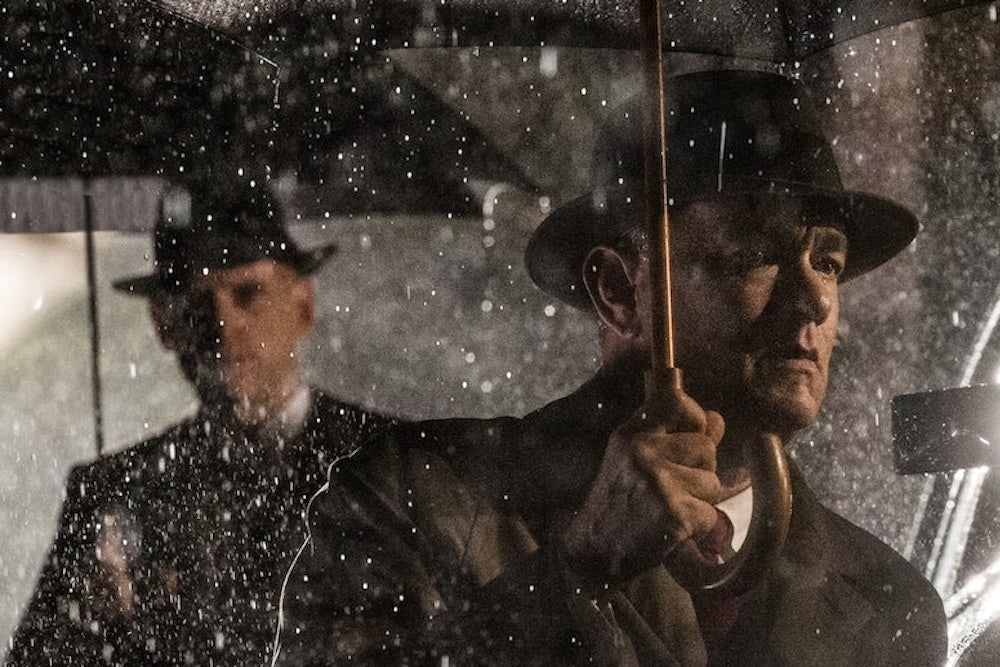It seems unlikely that a few years ago, when development began for the films now showing, Hollywood had the foreign policy foresight to predict that we would now be perched on the edge of a second Cold War. Yet here we are, and somehow they did. Russia annexed the Crimea, and the war in Syria has increasingly become a proxy war between the two old foes. But the current spate of pop-culture Cold War nostalgia has deeper roots than historical déjà vu. As the war that never really was, the Cold War’s central moral questions are especially applicable to a society grappling more than ever with long-bubbling conflicts of ambiguous judicial standing. Are the rules of justice the same when the fighting only takes place on paper, via spies, or with drones?
The Americans, the FX show about KGB sleeper agents that premiered in 2013, was the advance-guard of this movement, but this year the trend accelerated: There was Deutschland 83, the big screen re-make of ’60s series The Man from U.N.C.L.E., The Man Who Saved the World, a documentary about a Soviet soldier who averted nuclear disaster, and Pawn Sacrifice, the Bobby Fischer biopic that uses chess as a Cold War proxy. All of these films and TV shows explore how the blurred lines of war and diplomacy, and enemy and self, trickle down to similarly blurred lines between right and wrong.
Steven Spielberg and Tom Hanks’s latest collaboration, Bridge of Spies, is the most recent installment of this Cold War moment. Though it dabbles in the cloak-and-dagger adrenaline of spy films, it is a war film at heart, grappling with the moral ambiguities and legal complexities of a conflict shrouded in secrecy and confusion. Bridge of Spies asks whether America’s commitment to justice is a deeply held and practiced belief, or simply public relations bluster. Hanks stars as James Donovan, the real-life insurance lawyer who in 1957 defended accused Soviet spy Rudolf Abel. Abel’s trial puts America’s values on the line. “It can’t look like our justice system tosses people on the ash heap,” the head of the Brooklyn Bar Committee tells Donovan while trying to entice him to take the case. But defending Abel puts Donovan in a tricky position: Does a spy really deserve judicial protections?
Bridge of Spies is surprisingly warm and funny for a film about the Cold War. It doesn’t shrink away from the nastiness of the time—people are shot trying to leave East Berlin—but it’s optimistic that a few good people might be enough to keep the world on track. And as Donovan, Hanks remains Hollywood’s most reliable, likable do-gooder. Donovan empathizes with Abel not because he agrees with Abel’s politics, but because treating Abel as a human being is the right thing to do. When Abel requests painting supplies in prison, Donovan is swayed by the argument that he would want Americans in the USSR to be treated with the same kindness. Later, when Donovan arranges a prisoner swap of Abel and a downed American pilot, he insists on negotiating for an imprisoned American student as well, even though the CIA is more than willing to let him linger in an East German prison.
Donovan’s actions are rooted in ideas of righteousness commonly held up as intrinsically American, used then and now to justify wars for “democracy.” But of course, these ideas are not universally practiced, or even or believed. People leer at Donovan on the subway, and his children suffer a drive-by shooting at his house one night. When the CIA director orders Donovan to negotiate the prisoner exchange with the Soviet Union without official government backing, Dulles says, “You’re doing it for your country but your country doesn’t know it yet.” The making of Bridge of Spies ensures that Donovan’s country knows his contributions now, but the movie implies we don’t really deserve him. After all, it’s debatable whether the American public is any better at recognizing a hero today than they were 60 years ago.
You could spend hours teasing out all of the movie’s parallels to today, but those are almost trivial treats in comparison to the bigger themes Spielberg sews into his cinematography. He subtly apes the cinematography of the era, filling the movie with Hitchcockian close-ups and noirish shots of men conversing in the pouring rain, water cascading off their umbrellas. Courtroom scenes are illuminated by fuzzy sunlight that bleeds at the edges, making the film look old and degraded. These artistic touches elevate the tale from a self-congratulatory period piece to allegory; Donovan’s story escapes the specificities of its “true story” tagline and could be transposed to any human moment.
The details of the story in Bridge of Spies are specific to their time, but the broader conflicts from which they stem remain pertinent. “We’re in a battle for civilization,” says a judge in the film. That sentiment hasn’t lessened since the end of the Cold War. The question is whether we are any better at living up to our values today than we were then, or if we still need a standout like James Donovan to be our conscience.
